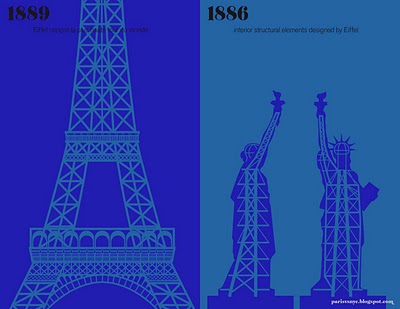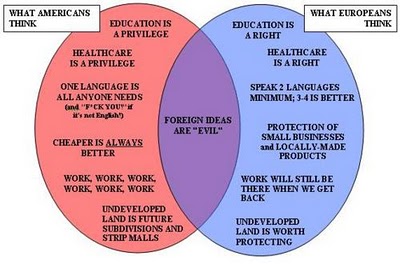Psychological Differences between the French and Americans: Communicating More Effectively in French

Communicate in French
- Intercultural differences and misunderstandings ; stereotypes ; French-bashing ; anti-americanism
The source material for this article. Very interesting stuff. - I Want To Learn French: The Best Software To Help You Reach Your Goal
Take action and achieve your language learning goals. We'll help you choose the best learning tools. Don't just say "I want to learn French." Do it now!
Language more than words, it is part of a worldview
A language is not just a list of words with pre-defined meanings and grammar conventions that you can then "objectively" interchange from one setting to the next, once you learn the rules.
Just like everyone must tell a joke in their own way in order to get a laugh, to really communicate you must understand the listeners' culture, what their unspoken and unconscious hopes are, fears, experiences, histories, annoyances, the things they admire, etc. etc.
Languages are invented by particular people in a particular place, and going through certain experiences together, having favourite jokes, television shows, music and popular songs, historical personalities, sayings, most loved food, etc.
A language like French is especially suffused with cultural subtleties, nuances, historical and cultural references, hip slang, and other such things. Understanding French culture is crucial to understanding the French language.
That is why the best language learning software, like Rosetta Stone, Fluenz, TellMeMore, Rocket Languages, etc., have cultural components as essential parts of their teaching and learning strategies, some more than others.

French vs. American culture
There are great and interesting analyses of French and American culture that have been written since the time of the Enlightenment. Both countries are fascinated and repelled by each other. They had revolutions around the same time, both consider themselves the birthplace of modern freedom and democratic republics, they share the Statue of Liberty, and so on. Alexis de Tocqueville is the most famous observer of the two countries, but there are others.
One psychoanalyst, Pascal Baudry, who lived in California and gave seminars on international management, has a fascinating take on the subject. It’s not just about how the French like croissants, baguettes, and La Vache qui Rit cheese, while Americans like bacon and eggs for breakfast, but much deeper.

Psychological differences between the French and Americans
For him, the differences go all the way back to child rearing. The fact that Americans are put on baby food early and toilet trained late, while the French are weaned late but toilet trained early lies at the root of so many other culture and personality differences. I’m not sure how exactly he thinks it is important, but it is probably deeply Freudian and disturbing in any case!
Interestingly, he notes the values of education when American mothers tell their children to “have fun”, while French mothers tell their children “be good”. This illustrates the authoritarian nature of French education, as opposed to the independence-oriented American education.
Americans
| French
|
|---|---|
are highly explicit
| are highly implicit
|
optimist and positive: value present and future ; good at action
| pessimist and negative: value past ; good at analysis and criticism
|
binary : "it is true or false
| contextual : "it depends
|
like what is simple
| like what is complex
|
do not lie (it is bad)
| lying is no big deal
|
want to be loved
| want to be independent
|
social identity is based on the individual
| social identity is based on being a member of a group
|
law and contracts must be respected ; everything is in the contract once it is signed
| try not to get caught ; signing a contract is just the beginning of a relationship
|
a contract is not linked to the relationship
| the contract is strongly associated with the relationship
|
process oriented : everything must be clear and documented ; reacts as planned
| like grey zones and nuances ; very creative ; very quick to react and sometimes more inventive
|
try to get a win-win deal
| if the other one wins, it means that I'll lose
|
DOING : you are judged on what you do
| BEING : you are judged on what you are
|
An example : with the same word ("to do" and "faire"), you get two very different meanings :
| |
positive : a "doer" is someone who gets things done
| negative : a "faiseur" is someone who is arrogant and obnoxious
|
value quality of work
| value quality of life
|
Source: Philippe Rochefort
Models Never 100% Accurate
Sure these are stereotypical and not true of all individuals. But there is a lot of truth in the analysis, and it really helps you understand the French mind, and in the end, communicate that much better with French people. Understanding your own cultural and experiential biases, and how it is different from the French.









